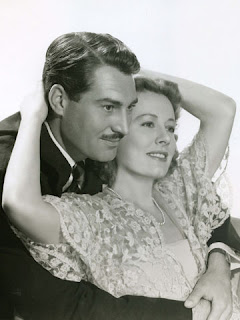publicity for "Anna and the King of Siam"
Release date 06.20.1946
"Et cetera, et cetera, et cetera..."
In 1862, young widow Anna Owens (Irene) arrives with her son Louis (Richard Lyon) in Bangkok to teach the children of the King of Siam (Rex Harrison.) Although she was promised a house of her own she and Louis have to settle into their living quarters in the palace only to discover that they are living next to the king's harem. However, Anna starts her job not only teaching the 67 children of the king but also his favorite wives.
One class, one family!
Confronted with a king who one one side wants to modernize his country and find a place for it in the modern world and on the other side is still rooted in rather cruel traditions, Anna has to fight a lot of battles. So, we find ourselves in a story about slavery, fitting out the king's wives for a dinner party with European dignitaries, the burning of a run-away wife, and how to get along with a "barbarian" totalitarian monarch who does not know how to use a napkin. But of course stiff-upper-lip Anna manages to hold her own against him and to influence not only the king but his son and heir...
That's not the only clash of culture...
The author on whose book "Anna and the King of Siam" is based, Margaret Landon, lived in Siam for a decade and used the memoirs of the "real" Anna who taught English from 1862 till 1867 at the Siamese court. In its turn the film is full of historical inaccuracies and it's no wonder that Irene Dunne was a little bit hesitating to meet the delegation from Thailand during her time as alternate delegate at the United Nations in 1957. (Siam became Thailand in 1939.)
Even not expecting correctness from a Hollywood production the whole thing doesn't work for me. I simply don't understand the fascination of the topic which led to a musical, a TV series and a remake. So, basically not impressed by the story there are some more obstacles on my way to the film.
Firstly there is the simple fact that it was not filmed in color. 20th Century Fox did spend a lot of money on the setting and the costumes - all written elaborate production over it - which makes the decision to film in BW hardly understandable. If I could indulge in lavish Classic Hollywood colors - "Leave her to Heaven" like - fitting in the exotic surroundings and Miss Dunne in the middle of the bliss, this movie certainly would have a better standing with me.
Firstly there is the simple fact that it was not filmed in color. 20th Century Fox did spend a lot of money on the setting and the costumes - all written elaborate production over it - which makes the decision to film in BW hardly understandable. If I could indulge in lavish Classic Hollywood colors - "Leave her to Heaven" like - fitting in the exotic surroundings and Miss Dunne in the middle of the bliss, this movie certainly would have a better standing with me.
Color, please!
Secondly, Mr. Harrison blocks me. He started his succesful Hollywood career as King Mongkut and although he prepared meticulously for the part, his performance landed to much on the ridiculous side for me. It's partly embarrassing what I don't like and the heavy make-up to make him look Asiatic isn't helpful either. Anyway, one has to live with Asians a la Hollywood which works pretty well for Linda Darnell and Gale Sondergaard but Lee J. Cobb as the prime minister looks out of place.
Looks probably better in BW!
Even our heroine doesn't make my day! It's certainly a solid performance but Miss Dunne scores mainly with her looks in period costumes and many close-ups very well photographed by Arthur Miller who won an Academy Award for his work. For the first time Irene uses what I call her "housewife voice" (we will hear this one again in some films to come) and this partly irritates me. Avoiding sexiness and playfullness in tone is of course correct for the part but doesn't sound like the fine-tuned instrument I'm used to.
Play of shadow and light
However, at least Miss Dunne trusted in the story because for the very first time she negotiated a deal in which she relinquised any upfront salary and would earn all of her income from the film's distribution profits. Fortunately the confidence in her star commodity turned out at the box office. "Anna and the King of Siam" is in the top ten of Irene's films when it comes to financial profit. Good for la Dunne that obviously the audience liked that flick a lot more than I do.



































.jpg)
b.jpg)

































b.jpg)

